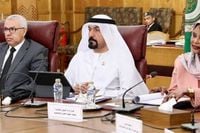On May 7, 2025, the Emirates Intellectual Property Association participated in a significant celebration organized by the Arab League in Cairo, marking World Intellectual Property Day 2025. The event was themed "Intellectual Property and Music: Singing the Praises of Intellectual Property," which highlights the importance of intellectual property rights within the creative sector.
Representing the Emirates Intellectual Property Association was Dr. Abdul Quddus Abdul Razzaq Al-Obaidli, the Chairman of the Board of Directors. During the event, he presented a paper titled "The Efforts of the Emirates Intellectual Property Association in Promoting Musical Creativity within the Framework of Protecting Intellectual Property Rights." In his address, Al-Obaidli emphasized the association's initiatives aimed at supporting young musicians while fostering a legal environment that encourages innovation and creativity in the UAE.
Al-Obaidli noted that the association's efforts align with the strategic directions to bolster the knowledge economy in the region. "Our participation reflects our commitment to supporting regional efforts to raise awareness about the importance of protecting intellectual property rights, especially in creative fields like music, which is a fundamental pillar of the Arab creative economy," he stated.
He further emphasized the necessity of enhancing coordination and collaboration among Arab institutions to tackle future challenges in this vital field. The event not only served to celebrate creativity but also aimed to inspire a collective movement towards stronger protections for intellectual property in the Arab world.
In a parallel development, the UAE is advancing its legislative framework by introducing a groundbreaking regulatory system that utilizes artificial intelligence to streamline the legislative process. This initiative was announced by the Minister of State for Foreign Affairs, Maryam bint Ahmed Al Hammadi, on the same day, May 7, 2025.
The new framework, which is the first of its kind globally, aims to enhance efficiency and speed in legislative development, ensuring that laws are not only crafted quickly but also with a higher degree of quality. "We are entering a new phase in legislative development with this smart regulatory framework, which will allow us to respond instantly to global changes and identify legislative gaps," stated Al Hammadi.
The framework is designed to develop scenarios that simulate the impact of legislation and to apply modifications in real-time, thus revolutionizing how laws are created and implemented in the UAE. Al Hammadi explained that the system will prioritize identifying what needs regulation, when it should occur, and how to proceed. "It’s crucial that our regulatory philosophy is rapid, progressive, and flexible to adapt to fast-paced changes, facilitating sustainable growth and progress," she added.
In April 2025, the UAE Council of Ministers announced the establishment of a new office dedicated to regulatory legislation experts. This office is tasked with creating a comprehensive map that encompasses all federal and local legislation within the country, further enhancing the legislative landscape.
Al Hammadi also highlighted the significant legislative reforms undertaken in recent years, noting that over 85% of UAE laws have been updated in the past five years. "As regulators and policymakers in the UAE, we recognize that to remain influential and relevant in a rapidly changing world, we must adopt a comprehensive regulatory philosophy," she stated during her keynote address at the Future of Government Summit in Dubai.
The Minister expressed the UAE's eagerness to collaborate with key market players to build a competitive framework that delivers sustainable benefits for all stakeholders. She pointed out that the UAE has witnessed tremendous transformations in its markets over the last two decades and predicted that the next ten years would see even more significant changes.
These two developments—the celebration of World Intellectual Property Day and the launch of the AI-driven regulatory framework—highlight the UAE's commitment to fostering creativity and innovation while ensuring that legal frameworks keep pace with technological advancements and global trends.
Both initiatives underscore the UAE's strategic vision to enhance its position as a leader in the creative economy and regulatory innovation, aiming to create an environment where creativity thrives and intellectual property rights are robustly protected.




